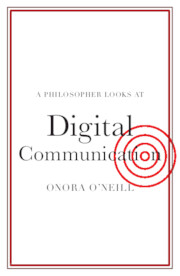
-
Select format
-
- Publisher:
- Cambridge University Press
- Publication date:
- January 2022
- February 2022
- ISBN:
- 9781108981583
- 9781108986816
- Dimensions:
- Weight & Pages:
- Dimensions:
- (198 x 129 mm)
- Weight & Pages:
- 0.2kg, 150 Pages
You may already have access via personal or institutional login
Book description
Communication is complicated, and so is the ethics of communication. We communicate about innumerable topics, to varied audiences, using a gamut of technologies. The ethics of communication, therefore, has to address a wide range of technical, ethical and epistemic requirements. In this book, Onora O'Neill shows how digital technologies have made communication more demanding: they can support communication with huge numbers of distant and dispersed recipients; they can amplify or suppress selected content; and they can target or ignore selected audiences. Often this is done anonymously, making it harder for readers and listeners, viewers and browsers, to assess which claims are true or false, reliable or misleading, flaky or fake. So how can we empower users to assess and evaluate digital communication, so that they can tell which standards it meets and which it flouts? That is the challenge which this book explores.
Reviews
'This book tackles one of the most crucial ethical issues facing us in the age of online communication and digital information. It is clear, concise and yet deep and insightful.'
Maria Baghramian - University College Dublin
‘… this book is an important and original contribution to the ethics of digital communication. It is definitely worth reading, especially for those working on the ethics of technology and the digital public sphere.’
Ugur Aytac Source: Metascience
Contents
-
1 - Presuppositions of Communication
pp 3-14 -
-
- You have access
- HTML
- Export citation
-
Metrics
Altmetric attention score
Full text views
Full text views help Loading metrics...
Loading metrics...
* Views captured on Cambridge Core between #date#. This data will be updated every 24 hours.
Usage data cannot currently be displayed.
Accessibility standard: Unknown
Why this information is here
This section outlines the accessibility features of this content - including support for screen readers, full keyboard navigation and high-contrast display options. This may not be relevant for you.
Accessibility Information
Accessibility compliance for the PDF of this book is currently unknown and may be updated in the future.


